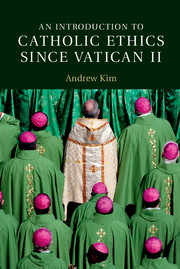Book contents
- Frontmatter
- Dedication
- Epigraph
- Contents
- Foreword
- Preface
- Acknowledgments
- Abbreviations
- Introduction
- PART 1 FOUNDATIONS OF CATHOLIC ETHICS
- PART II GRACE AT THE HEART OF VIRTUE
- PART III CATHOLIC SOCIAL TEACHING
- 7 Justice in the Catholic Moral Tradition
- 8 The Principles of Catholic Social Teaching
- 9 The Just War Tradition
- PART IV BIOETHICS
- Epilogue
- Appendix
- Bibliography
- Index
7 - Justice in the Catholic Moral Tradition
from PART III - CATHOLIC SOCIAL TEACHING
Published online by Cambridge University Press: 05 May 2015
- Frontmatter
- Dedication
- Epigraph
- Contents
- Foreword
- Preface
- Acknowledgments
- Abbreviations
- Introduction
- PART 1 FOUNDATIONS OF CATHOLIC ETHICS
- PART II GRACE AT THE HEART OF VIRTUE
- PART III CATHOLIC SOCIAL TEACHING
- 7 Justice in the Catholic Moral Tradition
- 8 The Principles of Catholic Social Teaching
- 9 The Just War Tradition
- PART IV BIOETHICS
- Epilogue
- Appendix
- Bibliography
- Index
Summary
“For I, the Lord, love justice.”
Isaiah 61:8In his first Apostolic Exhortation, Evangelli gaudium (the Joy of the Gospel), Pope Francis explains the connection between the unity of the virtues and Catholic social teaching: “Just as the organic unity existing among the virtues means that no one of them can be excluded from the Christian ideal, so no truth may be denied…each truth is better understood when related to the harmonious totality of the Christian message; in this context all of the truths are important and illumine one another.” Truths regarding individual morality and social morality are both part of the fabric of the Gospel. We must not focus solely on one set of teachings to the exclusion of the other. Indeed, as we mentioned earlier, the cardinal virtue of justice involves not only the proper ordering of the individual soul, but also the larger community. While the primary emphasis of prior chapters has been on justice as understood in the former sense, the focus in what follows is on justice as it pertains to political, social, and economic issues with respect to communities, nations, and the global family.
As Benedict XVI observed, the principles of Catholic social teaching are rooted in a particular understanding of justice. The purpose of this chapter is to elucidate this understanding. Thus, this chapter examines four prominent themes of justice within the Catholic moral tradition: primary justice, rectificatory justice, justice as right order, and justice as rights. The first section examines the prevalence of these themes in the Old Testament. Next, we see how the New Testament reinforces these themes. Here we find that, contrary to an erroneous view held by some, justice and love imply rather than contradict each other. Indeed, as we saw in the previous chapter's analysis of the unity of the virtues, there can be neither love without justice nor justice without love.
- Type
- Chapter
- Information
- An Introduction to Catholic Ethics since Vatican II , pp. 107 - 118Publisher: Cambridge University PressPrint publication year: 2015



